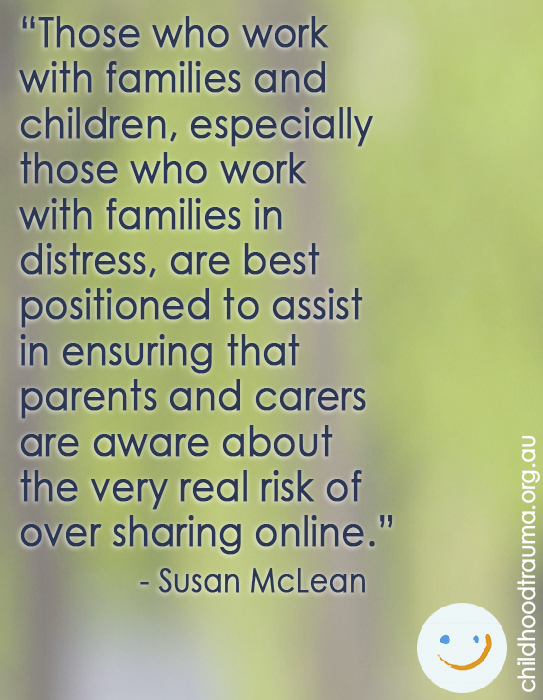
Think before you post! Reducing the risk when posting pics of kids online.

This blog entry was authored by Susan McLean. Susan is Australia’s leading and most highly qualified Cybersafety Expert and internationally renowned for her knowledge in this area. She has authored Policy for a range or organizations and many educational resources for schools as well as providing Professional Learning for a wide range of organisations. She was a serving Police Officer for 27 years and has extensive experience in dealing with the online solicitation and exploitation of children. You can find here on twitter as @thecybercop1 and on the web at www.cybersafetysolutions.com.au.
Children today have access to, and are accessible by many millions of people worldwide. Teens are often not aware that their words and or photos, which may have been intended for a small audience, sometimes find their way to a larger one, often with both the unexpected and undesirable consequences.
Of course kids do not start their digital footprint themselves. That honour falls dubiously to parents, who so very often get caught up in wanting to share every proud and not so proud moment of their children’s lives with others online, but who fail to acknowledge or even fully understand the long term ramifications for their own children. We have all seen the positive pregnancy test followed by the ultrasound pics. We read and follow, often with distain those who blog and comment on every waking moment of their child’s life; parents living vicariously through their children.
A recent study conducted by The London School of Economics and Political Science in consultation with EU kids online found:
Many children below the age of nine were born with the first fragment of their ‘digital footprint’ already available online. These youngsters will be the first generation to experience the aggregated effect of living in a digital world over their whole lifetime. They will inherit their digital profiles as a work in progress from a parent who often assumes that the information they post carries the privacy and security levels available to them at the time of posting, or who did not consider such issue when they posted their child’s ultrasound photos or doctors report.
 In reality parents have always embarrassed their children. From the ‘daggy dad’ wearing unfashionable clothes and making inappropriate remarks, to the naked baby in the bath photos in their 21st birthday slide show, but today the world is a different place. Information once held privately in hard copy is now plastered online, on websites or in ‘the cloud’. Children have no say in the matter until they are old enough to understand and find it themselves, by which time it will be too late to do much about it at all, other than grin and bear it.
In reality parents have always embarrassed their children. From the ‘daggy dad’ wearing unfashionable clothes and making inappropriate remarks, to the naked baby in the bath photos in their 21st birthday slide show, but today the world is a different place. Information once held privately in hard copy is now plastered online, on websites or in ‘the cloud’. Children have no say in the matter until they are old enough to understand and find it themselves, by which time it will be too late to do much about it at all, other than grin and bear it.
Those who work with families and children, especially those who work with families in distress, are best positioned to assist in ensuring that parents and carers are aware about the very real risk of over sharing online. The use of social media in cases of Domestic or Family violence continues to rise and it is often up to the Family Court to adjudicate between warring parents in relation to the posting of pictures of children caught up in a relationship breakdown. People must understand that once the picture has been posted, uploaded or shared, you have lost control and have no way of knowing where the image will end up or potentially how it will be used.
 The online sexual solicitation of children via the collection of pics or direct contact on social media is a crime of opportunity. If, through education, the opportunity to offend is removed then that is a fantastic outcome. Police worldwide cannot catch every creep out there so education designed to prevent the crimes occurring is the only alternative we have. If all those who have access to families and children in a professional capacity are comprehensively educated then that vital information could be provided at a suitable time, sensitive to the needs of the family/child. It is therefore vital that these professionals have access to up to date education delivered by true experts in the field. This will ensure that parents/carers and the children themselves have every opportunity to protect themselves when considering posting online. If people could see what these creeps do once they have the pictures then they would certainly think twice about posting them. Many parents live in a world of social media where everyone is sharing everything in their lives with no regards to privacy.
The online sexual solicitation of children via the collection of pics or direct contact on social media is a crime of opportunity. If, through education, the opportunity to offend is removed then that is a fantastic outcome. Police worldwide cannot catch every creep out there so education designed to prevent the crimes occurring is the only alternative we have. If all those who have access to families and children in a professional capacity are comprehensively educated then that vital information could be provided at a suitable time, sensitive to the needs of the family/child. It is therefore vital that these professionals have access to up to date education delivered by true experts in the field. This will ensure that parents/carers and the children themselves have every opportunity to protect themselves when considering posting online. If people could see what these creeps do once they have the pictures then they would certainly think twice about posting them. Many parents live in a world of social media where everyone is sharing everything in their lives with no regards to privacy.
Here are some very important things to consider before you post online anything about a child online:
- Do I have location settings turned off so that the meta data cannot be read? (If not this allows people to find the exact address of where the picture was taken).
- Do I have the highest levels of security set for the account and only allow access to a small group of trusted friends? (Not public or friends of friends).
- Would I want that picture/comment about me doing the same thing from my childhood on the front page of a national newspaper? Would I cringe with embarrassment? What would my employer think?
- Am I aware that the image can be taken and used inappropriately or without my permission? (To advertise a product or for a pervert to use and share).
- Am I aware of any relevant organisational policy in relation to the taking and/or posting of images of children in my care/control?
- Have I sighted the signed permission given by the parent/carer for the pic to be taken and used? (This is a legal requirement by schools and is considered best practice for Sport, Dance and other co-curricular)
For professionals working with children, it is vital that you consider the legalities of children in your care being photographed. As many families do not want their child splashed all over social media sites, it becomes ‘your’ responsibility to ensure that other parents/carers do not photograph children other than their own. Some students will have a Family Court order prohibiting publication of a child’s image and it is incumbent on you, the school/organisation to be aware and have in place processes to protect the identity of that child. Failure to do so can result in being hauled before the Family Court. Schools and other organisations must actively educate their communities about this and ensure that they have robust and comprehensive policies in place. This includes any organisation that works with or interacts with children including Hospitals, Adolescent Mental Health, Welfare, Police, Sport, and Youth Programs etc.; policy that is implemented and most importantly followed. This is your legal, ‘duty of care’.
The reality is that predators love collecting images of kids, young, old, male, female clothed and unclothed so be aware that whilst this is abhorrent, it is real. When children are too young to understand then those entrusted with their care must ensure that their online safety and privacy are protected. Once using technology independently, children must not only be taught about the benefits of using technology but the risks as well. The online safety of children is everyone’s responsibility.
